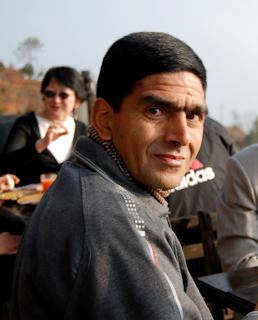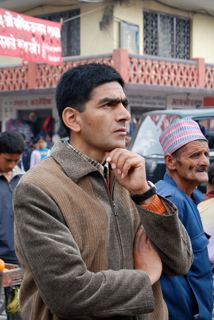 Ganesh Prasad Pandeya, Nepal
Ganesh Prasad Pandeya, Nepal
Undersecretary, Ministry of Local Development
Public Policy Program (’00/’02)
What is your area of specialization and how did you come to work in this area?
Though I have a broad academic background with degrees ranging from Law, Political Science to Public Administration, my area of specialization is mainly public sector management. I came to specialize in this area because, in my opinion, the public sector continues to play a strategic role across the world. Good governance, rule of law and an accountable and transparent public administration is regarded as the key to the realization of sustained economic growth, equity and social justice.
What are some of the biggest challenges you face in your work and what has been the most rewarding aspect of your career thus far?
One of the biggest challenges I face in my work is the delivery of public services to the targeted people, in particular the ultra poor. How to reach them and how to hear their voices, their grieves and anguishes have become more critical in making public service delivery effective and efficient. The ‘social elite’ has secured dominant control in most spheres of society and has thus captured almost all public resources for their benefits resulting in an inefficient allocation of resources and services with the poorest being marginalized. Trying to reach out to the poor is often like swimming against the current.
There are many reasons that can explain this failure. The most important one is that when compared with other developing countries such as India and Bangladesh, Nepal is an extremely heterogeneous society, with many castes, ethnic groups, languages and religions compounded by harsh geographical terrain. In such extremely heterogeneous society it is more difficult to build political and social support for public goods. To be more precise, cultural differences and the background of the people are the biggest problems for effective delivery of the services. On the basis of untouchability, low-caste people, for instance, have been excluded in delivering services from some public schools and public clinics.
So far the most rewarding aspect of my career, while working as a local development officer in the District Development Committees, is having an opportunity of solidifying my exposure in public service management. This includes developing public service delivery mechanisms that work best for the poor and disadvantaged, and that ensure full participation of all stakeholders in all stages of planning process, from the initial planning phase to final benefit sharing. Given the multi-ethnic, multi-religious and multi-structural nature of the Nepali society, working with all people and aiming to restore the social balance, trust, hope and confidence between people and their institutions is both challenging and rewarding.
During your career as government official at the Ministry of Local Development, what achievement or experience do you treasure most?
While working in the local level government, being close to the people, it is crucial to understand that a blue-print idea of public  service mechanism does not work well even in the similar setting because of the socio-cultural and geographical differences. Bottom-up planning that captures the felt-need of the people, combined with tailor-made social mobilization is likely to be more effective and sustainable than any other kind of planning. Likewise, successful development projects need cooperation and an integrated, comprehensive approach that ensures a synergetic relationship between the various people and their institutions. Kennedy once said: “success has many fathers, failure is an orphan.” So if we are to be successful, we need to ensure that different fathers of development cooperate.
service mechanism does not work well even in the similar setting because of the socio-cultural and geographical differences. Bottom-up planning that captures the felt-need of the people, combined with tailor-made social mobilization is likely to be more effective and sustainable than any other kind of planning. Likewise, successful development projects need cooperation and an integrated, comprehensive approach that ensures a synergetic relationship between the various people and their institutions. Kennedy once said: “success has many fathers, failure is an orphan.” So if we are to be successful, we need to ensure that different fathers of development cooperate.
What do you see as the main challenges for Nepal over the course of the next five years?
Since Nepal is running on transitional political system, the first and foremost challenge, I think, is drafting and passage of a new constitution with federal and inclusive characteristics. The most contentious issue is the demand made by Madesh-based political parties, representing about half of country’s population, for full autonomy and self rule with a condition of one-Madesh one-Province. Similar demand is also raised by other major ethnic groups with grievances of exclusion and exploitation. The idea of ethnicity-based provinces will require the establishment of more than two dozen provinces, most of them will not be economically viable.
The second challenge is public safety – to restore and maintain law and order in the country so that all people feel a sense of security. The government should be at the forefront in saving lives, not allowing the creation of more widows, orphans and the homeless. The total breakdown of law and order is apparent from the incidents of random killing, abduction, terrorism, inhuman attacks by insurgent groups even to the law enforcement authority, and harassment of business people and the ordinary professionals for donation under the threat of ransom. Such lawlessness situation is deepening further by the apathy of the law enforcement authorities. The third challenge is struggle against rampant public corruption. It is said that almost half of the development budget ends up in private pockets of officials.
Last but not least, reducing endemic poverty that affects more than a half of the population is a major battleground for the days to come. Widespread poverty is perpetuated by heavy dependence of the Nepali people on traditional and subsistence farming, inadequate investment in infrastructure, and complex regulatory practices that discourage private enterprises and entrepreneurship.
What is your most valuable experience while studying at GRIPS?
I have been fortunate to be taught and advised by distinguished professors who are recognized experts in their fields. I got to study the theoretical and analytical foundations of their topics ensuring h4 international coverage across the courses. The courses sought to encourage us to discuss different perspectives rather than orthodoxy and adopt panoramic view over zoom view. The courses exposed us to a colorful mix of different disciplines and theories. I am always grateful to our respected professors for their best efforts to make this institute more academic, attractive and interesting.
What was the most important thing you learned about Japanese society while here?
Besides academic achievements, the most important thing I learned while I was in Japan is the understanding of Japanese society and its ethics, values and norms, which are quite similar to those in Nepal. The culture of group decision making, practical attitudes towards solving any problems, natural love and affection to all people, respect for elders, and instinctive communication and human relations have always fascinated my thoughts, my mind and my life.
What do you miss about Tokyo?
I miss one of the most civilized societies and probably the most nicely predisposed society towards foreigners. I also miss my respected sensei’s, and affectionate and cheerful GRIPS staffs.

What is your favorite thing to do when you are not working?
I spend most of my leisure time reading news and new books about strategic studies, economics and management, listening sentimental songs and music, having get-together with friends, and traveling around with family and sometimes with co-workers and staffs.
How do you maintain a balance between your work and the rest of your life?
Certainly I find it not easy to maintain the balance between work and my family and social life. However, the most important things that help me bring a sense of balance is the continuous practice of three formula –be always happy, be always positive, and keep always busy.
What advice would you give to current GRIPS students?
As a past student of GRIPS, my advices to the current students would be that in addition to concentrating on the course readings, try to acquire the habit of reading different kinds of books. It is an unparalleled source of knowledge and joy. I would also advise them to spend some time to learn about Japanese society and culture, and if possible participate in home-stay programs. Try to understand the hidden aspects of Japanese society and life style and its success in the world.





